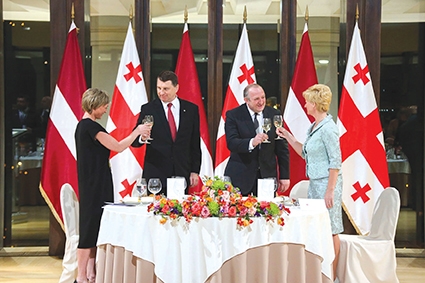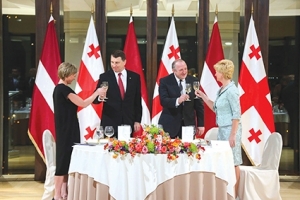Georgian, Latvian Presidents Mull Deeper Ties
The prospects of further strengthening relations between Georgia and Latvia in various fields were discussed at the meeting of Georgian President Giorgi Margvelashvili and his Latvian counterpart Raimonds Vejonis in Tbilisi on Tuesday.
The Georgian President highlighted the special importance of this visit, as it coincided with the launch of the visa-free regime with the European Union.
"It is symbolic that your visit coincides with this occasion. Latvia has greatly contributed to this process. Our countries are strategic partners and at every step we feel your firm support of our sovereignty and territorial integrity, European and Euro-Atlantic integration, Georgian state, and its further reinforcement," Margvelashvili told Vejonis at the meeting.
The parties also discussed the upcoming NATO Summit in Brussels and promotion of Georgia’s interests at the Summit, highlighting the necessity of strengthening business relations and the volume of bilateral trade in order to make full use of the economic potential of Georgia and Latvia.
The Georgian President pointed out at the meeting that Georgia is becoming increasingly attractive for Latvian business investments.
The importance of Georgia as a Europe-Asia transport corridor, the Silk Road, and the prospects of strengthening trans-regional cooperation were also discussed.
The conversation also touched upon the issue of strengthening economic ties between the regions of the Black and Baltic Seas, as well as cooperation in the areas of security, economics, culture and tourism.
“President Vejonis is our truly outstanding friend and I would like to thank him for his firm support of Georgia. We have discussed bilateral and multilateral cooperation, which Georgia and Latvia develop for the well-being of our peoples. We discussed regional cooperation between our countries. There is greatpotential for strengthening multilateral relations between Georgia and Latvia and it will definitely be realized. This includes strengthening cooperation in the areas of military, economics, education, science, and culture,” Margvelashvili said.
He also added that the Latvian President had criticized the occupation and annexation policy of the Russian Federation in Georgia’s breakaway territories. Margvelashvili pointed out that those living in Georgia’s breakaway Abkhazia and South Ossetia holding Georgian biometric passports are also able to benefit from visa liberalization with the EU.
“I believe that European integration will provide European ways of solving our conflicts. Solution of the conflicts that exist between us and the citizens living in the occupied territories should firstly be peaceful and secondly, in accordance with the format and tradition of the European states,” the Georgian President said.
The Latvian President congratulated the Georgian population on the successful termination of the visa liberalization process and the commencement day of the visa-free regime.
“We believe that each country has the right to make independent and sovereign choices on foreign and security policy, free from external pressures. We welcome the choices that Georgia has made and we continue to strongly support Georgia’s Euro-Atlantic aspirations. Georgia is one of the closest partners for NATO and the European Union. Latvia has always supported strengthening Georgia-EU relations and the main priority is to make full use of the Association Agreement,” he said, going on to underline that Georgia serves as an example for other aspirant countries with its dedication and hard work.
“It is important to continue this progress under the Substantial NATO-Georgian Package; it will boost Georgia’s defense capacities to better provide for your security, as well as strengthen relations with NATO member countries. It will also help Georgia to prepare for Georgia’s eventual membership,” Vejonis added. “The so-called parliamentary and presidential elections, as well as the so-called referendums in breakaway regions, are not in accordance with international law and will not be recognized by the international community”.
Following the extended meeting of the Presidents, Georgian and Latvian officials signed several memorandums of understanding and agreements regarding cooperation in various areas.
The two presidents also visited Khurvaleti village, which is adjacent to the occupied Tskhinvali region, where they spoke to the local people and listened to their problems.
President Vejonis said it is tragic that in the modern world, barbed wire can divide a sovereign country into two.
“These fences divide families. Latvia will never recognize such actions of Russia or occupation and we will always support Georgia’s integrity and sovereignty. I think it is very important that each country be sovereign and independent and, of course, we will work until this situation is resolved,” he stated.
Within the framework of visit, Vejonis will also visit EUMM office in Gori, Shida Kartli region.
Thea Morrison












